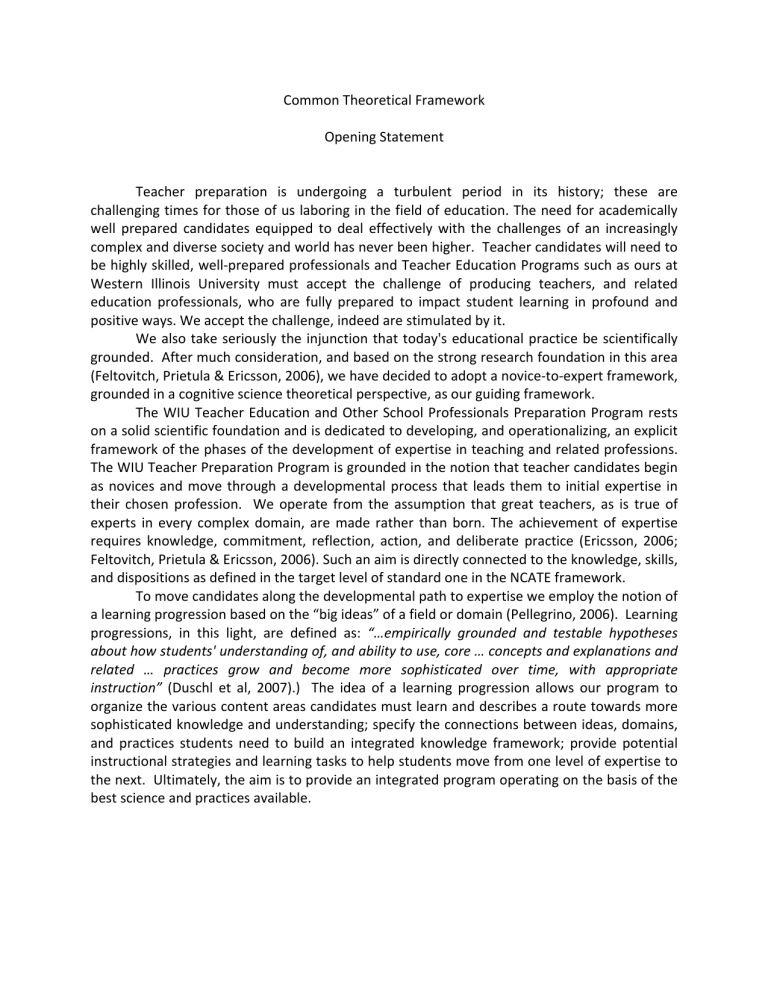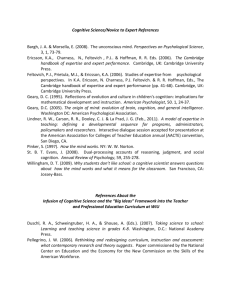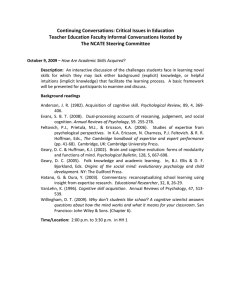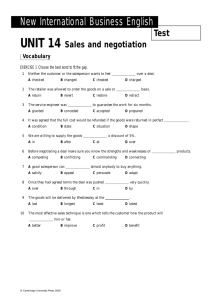Common Theoretical Framework Opening Statement Teacher preparation is undergoing a turbulent period in its history; ...

Common Theoretical Framework
Opening Statement
Teacher preparation is undergoing a turbulent period in its history; these are challenging times for those of us laboring in the field of education. The need for academically well prepared candidates equipped to deal effectively with the challenges of an increasingly complex and diverse society and world has never been higher. Teacher candidates will need to be highly skilled, well‐prepared professionals and Teacher Education Programs such as ours at
Western Illinois University must accept the challenge of producing teachers, and related education professionals, who are fully prepared to impact student learning in profound and positive ways. We accept the challenge, indeed are stimulated by it.
We also take seriously the injunction that today's educational practice be scientifically grounded. After much consideration, and based on the strong research foundation in this area
(Feltovitch, Prietula & Ericsson, 2006), we have decided to adopt a novice‐to‐expert framework, grounded in a cognitive science theoretical perspective, as our guiding framework.
The WIU Teacher Education and Other School Professionals Preparation Program rests on a solid scientific foundation and is dedicated to developing, and operationalizing, an explicit framework of the phases of the development of expertise in teaching and related professions.
The WIU Teacher Preparation Program is grounded in the notion that teacher candidates begin as novices and move through a developmental process that leads them to initial expertise in their chosen profession. We operate from the assumption that great teachers, as is true of experts in every complex domain, are made rather than born. The achievement of expertise requires knowledge, commitment, reflection, action, and deliberate practice (Ericsson, 2006;
Feltovitch, Prietula & Ericsson, 2006). Such an aim is directly connected to the knowledge, skills, and dispositions as defined in the target level of standard one in the NCATE framework.
To move candidates along the developmental path to expertise we employ the notion of a learning progression based on the “big ideas” of a field or domain (Pellegrino, 2006). Learning progressions, in this light, are defined as: “…empirically grounded and testable hypotheses about how students' understanding of, and ability to use, core … concepts and explanations and
related … practices grow and become more sophisticated over time, with appropriate instruction” (Duschl et al, 2007).) The idea of a learning progression allows our program to organize the various content areas candidates must learn and describes a route towards more sophisticated knowledge and understanding; specify the connections between ideas, domains, and practices students need to build an integrated knowledge framework; provide potential instructional strategies and learning tasks to help students move from one level of expertise to the next. Ultimately, the aim is to provide an integrated program operating on the basis of the best science and practices available.
Selected Bibliography
Expertise
Alexander, P. A. (2003). The development of expertise: the journey from acclimation to proficiency. Educational Researcher, 32, 8, 10‐14.
Anderson, J. R. (1982). Acquisition of cognitive skill. Psychological Review, 89, 4, 369‐406.
Barnett, S. M. & Koslowski, B. (2002). Adaptive expertise: Effects of type of experience and the level of theoretical understanding it generates. Thinking and Reasoning, 8 (4), 237–267
Bereiter, C. & Scardamalia, M. (1993). Surpassing ourselves: an inquiry into the nature and
implications of expertise. Chicago, IL: Open Court.
Berliner, D. C. (2004). Describing the behavior and documenting the accomplishments of
expert teachers. Bulletin of Science, Technology & Society, 24, 3, 200‐212.
Berliner, D. C. (1994). The wonder of exemplary performances. In, J. N. Mangieri and C. Collins,
Eds. Creating powerful thinking in teachers and students. Ft. Worth, TX: Holt, Rinehart &
Winston.
Butterworth, B. (2006). Mathematical expertise. In K.A. Ericsson, N. Charness, P.J. Feltovich.
& R. R. Hoffman, Eds., The Cambridge handbook of expertise and expert performance.
Cambridge, UK: Cambridge University Press.
Chi, M. T. H. (2006). Two Approaches to the Study of Experts’ Characteristics. In, K.A. Ericsson,
N. Charness, P.J. Feltovich. & R. R. Hoffman, Eds., The Cambridge handbook of expertise and expert performance. Cambridge, UK: Cambridge University Press.
Chi, M. T. H., Glaser, R. & Farr, M. J. Eds. (1988). The nature of expertise. Mahwah,NJ:
Lawrence Erlbaum Associates.
Clark, R. C. (2008). Building expertise: cognitive methods for training and performance
improvement, 3rd ed. San Francisco: John Wiley & Sons.
Committee on the Study of Teacher Preparation Programs in the United States (2010).
PreparingTeachers: Building Evidence for Sound Policy. Washington, D.C.: National
Academy of Sciences.
Dall’Alba, G. & Sandberg, J. (2006). Unveiling professional development: a critical review of stage models. Review of Educational Research, 76, 3, 383‐412.
Darling‐Hammond, L. (2006). Constructing 21st‐century teacher education. Journal of Teacher
Education, 57, 10, 1‐15.
Dreyfus, H. L. & Dreyfus, S. E. (1980). A five‐stage model of the mental activities involved in
directed skill acquisition. ORC‐80‐2. Operations Research Center, University of
California, Berkeley, pp. 1‐18.
Dreyfus, H. L. & Dreyfus, S. E. (1986). Mind over machine. NY: The Free Press.
Ericsson, K. A. (2006). The influence of experience and deliberate practice on the development
of superior expert performance. In K.A. Ericsson, N. Charness, P.J. Feltovich & R. R.
Hoffman, Eds., The Cambridge handbook of expertise and expert performance.
Cambridge, UK: Cambridge University Press.
Ericsson, K. A. & Lehmann, A.C. (1996). Expert and exceptional performance: evidence of maximal adaptation to task constraints. Annual Review of Psychology, 47, 273‐305.
Ericsson, K.A., Charness, N., Feltovich , P.J.. & Hoffman, R. R. Eds. (2006). The Cambridge handbook of expertise and expert performance. Cambridge, UK: Cambridge University
Press.
Feltovich, P.J., Prietula, M.J., & Ericsson, K.A. (2006). Studies of expertise from psychological perspectives. In K.A. Ericsson, N. Charness, P.J. Feltovich. & R. R. Hoffman, Eds., The
Cambridge handbook of expertise and expert performance (pp. 41‐68). Cambridge, UK:
Cambridge University Press.
Fitts, P.M. (1964). Perceptual‐motor skill learning. In, A. W. Melton, Ed. Categories of human
learning. NY: Academic Press.
Hoffman, R. R. (1998). How can expertise be defined? Implications of research from cognitive
psychology. In R. Williams, W. Faulkner, & J. Fleck (Eds.), Exploring expertise: issues and perspectives. New York: Macmillan.
Hammerness, K., Darling‐Hammond, L., Bransford, J, Berliner, D., Cochran‐Smith, M, McDonald,
M. & Zeichner, K. (2005). How teachers learn and develop. In, L. Darling‐Hammond & J.
Bransford, Eds. Preparing teachers for a changing world: what teachers should learn and be able to do. Jossey‐Bass.
Hatano, G. & Oura, Y. (2003). Reconceptualizing school learning using insight from expertise
research. Educational Researcher, 32, 8, 26‐29.
Lampert, M., & Clark, C. M. (1990). Expert knowledge and expert thinking in teaching: A
response to Floden and Klinzing. Educational Research, 19(5), 21–23.
VanLehn, K. (1996). Cognitive skill acquisition. Annual Reviews of Psychology, 47, 513‐539.
Voss, J. F. & Wiley, J. (2006). Expertise in history. In K.A. Ericsson, N. Charness, P.J. Feltovich.
& R. R. Hoffman, Eds., The Cambridge handbook of expertise and expert performance.
Cambridge, UK: Cambridge University Press.
Selected Bibliography
Big Ideas and Learning Progressions
Duschl, R. A., Schweingruber, H. A., & Shouse, A. (Eds.). (2007).
Taking science to school:
Learning and teaching science in grades K‐8 . Washington, D.C.: National Academy
Press.
Pellegrino, J. W. (2009).
The design of an assessment system for the Race to the Top: a learning
sciences perspective on issues of growth and measurement . Exploratory seminar presented at the Center for K‐12 Assessment & Performance.
Pellegrino, J. W. (2006).
Rethinking and redesigning curriculum, instruction and assessment:
what contemporary research and theory suggests . Paper commissioned by the National
Center on Education and the Economy for the New Commission on the Skills of the
American Workforce.
Stevens, S., Sutherland, L. A., Schank, P, & Krajcik, J. (2007). The big ideas of nanoscience .
Unpublished manuscript.
Stevens, S., Shin, M. & Krajcik, J. (2009). Towards a Model For the Development of an
Empirically Tested Learning Progression. Paper presented at the Learning Progressions in Science (LeaPS) Conference, June 2009, Iowa City, IA.
Wilson, M. (2009). Measuring Progressions: Assessment Structures Underlying a Learning
Progression.
Journal of Research in Science Teaching , 46, 6, 716‐730.








